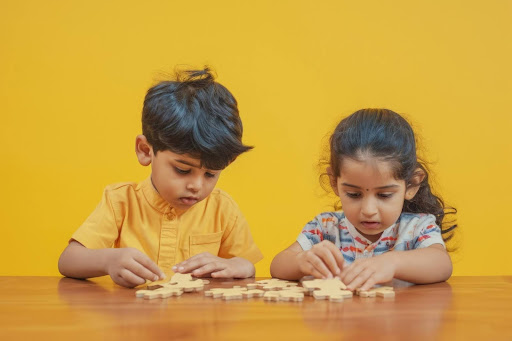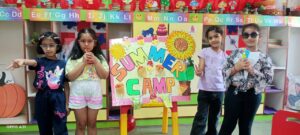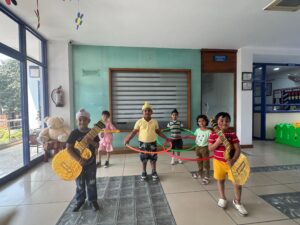Welcome to Tinkerbelle, where we believe in the transformative magic of play! For toddlers, play isn’t just a way to pass the time; it’s an essential component of learning and development. In this blog, we’ll explore how play-based learning fosters creativity, social skills, and cognitive growth in young children. Let’s dive into the enchanting world of play and discover how it can unlock your little one’s potential!
The Essence of Play-Based Learning
Play-based learning is an approach that encourages children to explore, create and learn through play. It’s grounded in the understanding that children learn best when they are actively engaged and having fun. Here’s 4 Key Benefits :
- Fosters Creativity and Imagination
When children engage in play, they enter a world of imagination. Whether they’re building a fort with cushions or pretending to be superheroes, their creativity flourishes. This imaginative play helps develop problem-solving skills and encourages children to think outside the box.
- Enhances Social Skills
Group play provides opportunities for toddlers to interact with their peers. They learn essential social skills such as sharing, cooperation, and communication. Through play, children navigate friendships, resolve conflicts, and understand the importance of empathy and kindness.
- Supports Cognitive Development
Play is a powerful tool for cognitive growth. When toddlers engage in activities like sorting blocks by color or counting their toy cars, they are building foundational math and literacy skills. Play-based learning also promotes critical thinking, as children make decisions and explore various outcomes during their playtime.

- Boosts Physical Development
Many play activities involve movement, helping toddlers develop their gross and fine motor skills. Climbing, jumping and dancing enhance physical coordination, while activities like drawing or building with small blocks improve dexterity and hand-eye coordination.
How to Incorporate Play-Based Learning at Home
5 Tips for Bringing Play-Based Learning Home :
- Create Play Zones
Designate areas in your home for different types of play, such as a reading nook, an art corner, or an outdoor play area. This encourages your child to explore various activities and stimulates their creativity.
- Use Everyday Items for Play
Everyday household items can be transformed into exciting learning tools. Use pots and pans for musical instruments, cardboard boxes for forts, or kitchen utensils for pretend cooking. The possibilities are endless!
- Engage in Imaginative Play
Encourage your child to use their imagination. Provide costumes, props, and materials that inspire storytelling and role-playing. Join in the fun and watch as their creativity blossoms!
- Organize Playdates
Facilitate playdates with other children to enhance social skills. Group play encourages cooperation and helps children learn from one another. Plus, it’s a great way for parents to connect!
- Follow Their Interests
Observe what captivates your child’s attention. If they love dinosaurs, create a dino-themed play area with books, toys, and crafts. Tailoring play to their interests keeps them engaged and excited about learning.
The Magic of Connection
At Tinkerbelle, we understand that every moment of play is an opportunity for growth. By embracing play-based learning, you’re not just providing entertainment; you’re fostering a lifelong love for learning.

Join the Tinkerbelle Community today!
We invite you to explore our workshops and resources designed to support play-based learning. Connect with other parents, share your experiences and discover new ways to inspire your little ones. Together, let’s unlock the magic of play and nurture the bright futures of our children.
In conclusion, playtime is more than just fun; it’s a vital ingredient in your toddler’s development. So, let’s celebrate the magic of play and make every moment an opportunity for learning!








